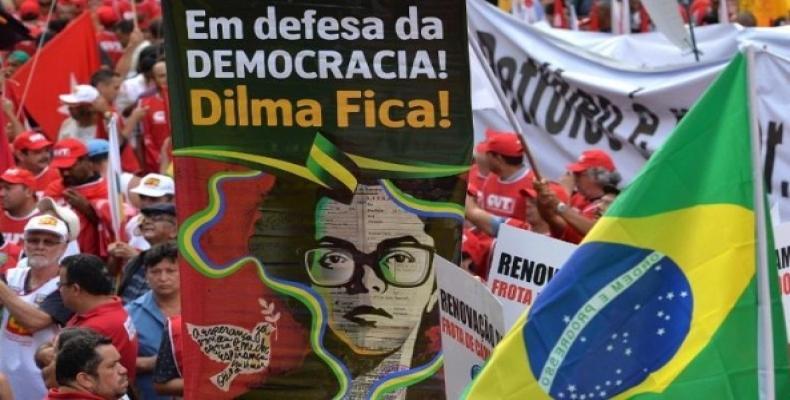Brasilia, December 5 (teleSUR-RHC)-- President Dilma Rousseff called on the public to fight for democracy in Brazil, calling the efforts to have her impeached a “coup” attempt against her government.
“For the sake of the health of our democracy, we must defend it against this coup,” said President Rousseff.
Earlier this week Eduardo Cunha, speaker of the Chamber of Deputies, accepted a request to begin impeachment proceedings against Rousseff, triggering a process that could potentially remove her from power.
The response to Cunha's decision was swift, with politicians and social movements accusing him of acting out of spite. Cunha is himself under investigation for alleged corruption in connection to a scandal involving the state oil company, Petrobras.
Cunha's position as speaker is also at risk, as he is facing an inquiry by the Ethics Council of the Chamber of Deputies for failing to disclose foreign bank accounts.
It was only after three lawmakers from Rousseff's party who sit on the Ethics Council said they would vote to remove Cunha from his position that he moved to begin impeachment proceedings.
However, the debate surrounding the possible impeachment of the president has been raging in Brazil for nearly a year. Government supporters allege the efforts to oust Rousseff via impeachment is a thinly-veiled attempt to overturn the results of the 2014 presidential election, where the incumbent president defeated her right-wing rival in the second round.
“By using functions assigned to the speaker to ensure his own defense in face of processes that should have resulted in the forfeiture (of his assets) and his imprisonment, this man demoralizes parliament and its democratic institutions,” read a statement by the Confederation of Popular Movements.
"The political forces that support impeachment are the same that idolize figures such as Cunha ... and ask for the return of a military dictatorship. In this scenario, the impeachment would mean the strengthening of conservative attacks and a sense of intolerance that has marked the behavior of these sectors,” read a statement from the Landless Rural Workers Movement, known as the MST, one of the largest political forces in Brazil.
Leftist movements have pledged to defend the Rousseff government and the country's democracy through street mobilizations. The president of the Workers Party, Rui Falcao, said the party was now entering into a period of “permanent mobilization.”
"Dilma was democratically elected by the Brazilian people,” stated the Popular Youth Uprising organization in a video shared on social media. “The youth will continue in the streets against Cunha. He represents an attack on the rights of women, Black people, and the LGBT community in our country. Eduardo Cunha is demonstrably corrupt and represents the coup-supporting sectors of Brazil.”
Social movements were not alone in their condemnation of Cunha's decision. Former president Luiz Iganacio Lula da Silva, Rousseff's predecessor, was unequivocal in his denunciation.
Nine governors from Brazil's northeast region also signed a collective statement condemning Cunha's decision. Even members of Cunha's own political party have come out against impeachment.
“He is a cynical blackmailer. He does not have even the least bit of credibility to lead a process like this,” said Jarbas Vasconcelos of the Brazilian Democratic Movement Party.


